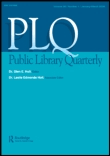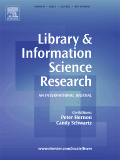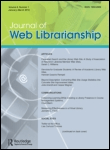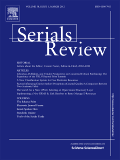
Public Library Quarterly
Scope & Guideline
Innovating library services for a dynamic society.
Introduction
Aims and Scopes
- Community Engagement and Social Inclusion:
The journal highlights the role of public libraries in fostering community engagement, social inclusion, and cultural capital. It explores how libraries serve as safe spaces for diverse populations and promote social cohesion. - Innovation and Technology in Libraries:
A significant focus is placed on the integration of technology and innovative practices within library services. This includes the use of digital tools, telehealth services, and makerspaces to enhance user experience and accessibility. - Diversity, Equity, and Inclusion (DEI):
Public Library Quarterly emphasizes the importance of DEI initiatives within library practices. It explores strategies for creating inclusive environments and addressing the needs of underserved populations. - Research and Development in Library Services:
The journal serves as a platform for empirical research that informs library practices and policies. It encourages studies that assess the effectiveness of library programs and their impact on community well-being. - Advocacy and Civic Engagement:
The role of public libraries as civic agents in advocating for social issues, including health, education, and democracy, is a core theme. The journal discusses how libraries can influence public policy and community resilience.
Trending and Emerging
- Digital Equity and Inclusion:
There is a growing emphasis on addressing the digital divide and promoting digital equity. Papers explore how libraries can enhance access to technology and digital literacy, particularly in underserved communities. - Health and Well-being Initiatives:
An emerging theme is the role of public libraries in promoting health and well-being, particularly through partnerships with health organizations and the introduction of telehealth services. - Social Work Integration:
The integration of social work practices within public libraries is gaining traction, reflecting a trend toward holistic service delivery that addresses the broader social needs of patrons. - Community Resilience and Sustainability:
Public libraries are increasingly recognized as vital players in promoting community resilience and sustainability. Research highlights their role in disaster preparedness, environmental education, and sustainable development goals. - Interdisciplinary Collaborations:
There is a trend toward fostering interdisciplinary collaborations between libraries and other sectors, such as education, health, and social services, to enhance community programming and outreach.
Declining or Waning
- Traditional Library Services:
There has been a noticeable decline in articles focusing on traditional library services, such as print collections and reference services. This reflects a broader shift toward digital resources and innovative programming. - Censorship and Materials Challenges:
While still relevant, discussions on censorship and materials challenges in libraries have decreased, possibly overshadowed by more pressing social issues and the evolving role of libraries in advocacy. - Single-Focus Programming:
The emphasis on single-focus programming (e.g., solely children's or adult services) appears to be waning, with a growing trend towards integrated, community-wide programming that addresses multiple demographics and needs.
Similar Journals

RDBCI-Revista Digital de Biblioteconomia e Ciencia da Informacao
Exploring innovations in information management.RDBCI-Revista Digital de Biblioteconomia e Ciencia da Informacao, published by the esteemed Universidade Estadual de Campinas, is a premier Open Access journal dedicated to advancing the fields of Library and Information Science, Education, and Public Administration. Since its inception in 2003, this multidisciplinary journal has aimed to provide a platform for high-quality research and discourse, contributing to the academic community both in Brazil and globally. With the E-ISSN 1678-765X, the journal addresses contemporary issues and innovations in information management, ensuring accessibility to a diverse audience. RDBCI holds a respectable position among its peers, boasting a Q3 ranking in Library and Information Sciences and various Q4 classifications in Education and Information Systems as of 2023. Scholars and practitioners are encouraged to submit their work, engage with research trends, and explore significant advancements in the discipline through this vital source of knowledge.

LIBRARY AND INFORMATION SCIENCE
Advancing scholarship in the evolving world of information.LIBRARY AND INFORMATION SCIENCE is a specialized academic journal dedicated to the advancement of knowledge and scholarship in the field of library and information sciences. Published by MITA SOC LIBRARY INFORMATION SCIENCE, this esteemed journal has been a crucial platform for scholarly communication since 1980, addressing the dynamic challenges and developments in the information landscape. Although it holds a Q4 category ranking in the Library and Information Sciences according to the 2023 Scopus Ranking, the journal serves a unique niche, providing insights and fostering discussions among a diverse audience of researchers, professionals, and students. With no Open Access options currently available, its valuable research contributions are accessible through institutional subscriptions and library access. The journal aims to disseminate innovative research, case studies, and theoretical explorations that enhance our understanding of information behavior, retrieval systems, library management, and emerging technologies, thus promoting an informed society in an increasingly digital world. Given its focused scope and enduring presence, LIBRARY AND INFORMATION SCIENCE continues to be an essential resource for anyone invested in the future of libraries and information services.

Journal of the Canadian Health Libraries Association
Exploring critical issues in health libraries and information sciences.The Journal of the Canadian Health Libraries Association is a pivotal open-access journal dedicated to advancing the field of health librarianship and information sciences. Published by the Canadian Health Libraries Association, this journal has been fostering the dissemination of innovative research and practices since its inception in 2004. With a focus on critical issues in library and information sciences as well as miscellaneous medicine, it has achieved commendable rankings, noted as Q2 in Library and Information Sciences and Q3 in Medicine (miscellaneous) as of 2023. The journal serves as a vital platform for health librarians, researchers, and practitioners in Canada and beyond, providing valuable insights and fostering collaborations in an ever-evolving information landscape. With its address based in Thunder Bay, Ontario, Canada, and an ISSN of 1708-6892, the journal invites contributions that aim to enhance understanding and improve practices within the health information sector, making it an essential resource for anyone engaged in health libraries and information management.

Collection and Curation
Exploring Innovative Strategies in MuseologyCollection and Curation is a prominent academic journal published by EMERALD GROUP PUBLISHING LTD, dedicated to the fields of Library and Information Sciences and Museology. With a significant impact in its domains, the journal has achieved a category quartile ranking of Q3 in Library and Information Sciences and Q2 in Museology as of 2023. It is noteworthy that in the Scopus rankings, it stands at an impressive #8 out of 83 in Museology, placing it in the 90th percentile, while also ranking #112 out of 280 in Library and Information Sciences, positioning it within the 60th percentile. Since its inception in 2018, the journal has been instrumental in advancing research and discussion around the critical themes of collection development and curation methodologies. Although it currently does not offer open access, the journal's rigorous peer-review process ensures high-quality scholarly contributions that are indispensable for researchers, professionals, and students aiming to enrich their understanding and practices in these important fields. By focusing on innovative strategies, practices, and case studies, Collection and Curation continues to shape the future of information management and museum studies.

LIBRARY & INFORMATION SCIENCE RESEARCH
Navigating the complexities of information dissemination.LIBRARY & INFORMATION SCIENCE RESEARCH is a premier academic journal dedicated to advancing the field of library and information sciences. Published by Elsevier Science Inc, this journal has established its reputation for rigorous research and impactful scholarship since its inception in 1987. With an impressive Q1 ranking in Library and Information Sciences and a Q2 ranking in Information Systems for 2023, it reflects the growing importance of library sciences in an increasingly digital world. The journal serves as an essential platform for researchers, professionals, and students, offering insightful articles that address emerging trends and challenges in the realm of information dissemination and management. Although not an open-access journal, its contributions are widely recognized, as evidenced by its strong Scopus rankings, with a position of #53 out of 280 in Library and Information Sciences. If you are looking to deepen your understanding of the dynamic interplay between libraries, technology, and information systems, LIBRARY & INFORMATION SCIENCE RESEARCH is an indispensable resource in your academic journey.

Evidence Based Library and Information Practice
Championing open access to enrich library and information practices.Evidence Based Library and Information Practice is a premier open-access journal published by the University of Alberta, Canada, since 2006. With a firm commitment to advancing research in the Library and Information Sciences, this journal provides a platform for the dissemination of innovative practices and empirical studies that inform library and information services globally. Recognized in 2023 with a Q3 category rating within its field, it ranks 169 out of 280 in the Scopus database, reflecting its growing influence and relevance. The journal’s objective is to bridge the gap between theory and practical applications, making it an essential resource for librarians, scholars, and students who seek evidence-based insights to enhance library practices and information management. By facilitating open access to high-quality research, Evidence Based Library and Information Practice plays a crucial role in fostering an informed academic community.

Malaysian Journal of Library & Information Science
Showcasing Scholarly Excellence in Library ScienceMalaysian Journal of Library & Information Science, published by the University of Malaya, Faculty of Computer Science & Information Technology, serves as a crucial platform for researchers, professionals, and students in the field of Library and Information Sciences. With a commitment to advancing scholarly knowledge, this journal has consistently showcased significant research contributions since its inception in 1996, and is currently indexed in Scopus, ranking in the 62nd percentile among its peers. The journal's Q2 categorization reflects its growing impact and relevance in the scholarly community. Although it operates as a traditional subscription-based journal, the publication holds great importance for those looking to delve into innovative practices and emerging trends within library and information sciences. Researchers and practitioners can access valuable insights that contribute to a deeper understanding of the evolving landscape in Malaysia and beyond. Addressed from Kuala Lumpur, Malaysia, the journal welcomes contributions that further exploration and scholarship in the vital field of information dissemination and management.

Bibliothek Forschung und Praxis
Exploring Innovations in Library ScienceBibliothek Forschung und Praxis is a distinguished journal in the field of library and information science, published by WALTER DE GRUYTER GMBH. With its ISSN 0341-4183 and E-ISSN 1865-7648, this journal provides a vital platform for researchers, professionals, and students to explore the latest developments, innovative practices, and theoretical advancements in library research. Situated in the academic hub of Berlin, Germany, the journal encourages submissions that address a wide array of topics pertinent to libraries, archives, and information services, aiming to foster dialogue and collaboration within the global academic community. Although it currently does not offer Open Access options, the journal ensures rigorous peer-review processes uphold the integrity and scholarly quality of published works. With a commitment to enhancing the field of library science, Bibliothek Forschung und Praxis plays a crucial role in shaping best practices and promoting deeper understanding among scholars and practitioners alike.

Journal of Web Librarianship
Inspiring New Paradigms in Library and Information SciencesWelcome to the Journal of Web Librarianship, an esteemed publication dedicated to the evolving landscape of library science and information technology. Published by Routledge Journals, Taylor & Francis Ltd, this journal serves as a vital platform for researchers and professionals to share innovative practices, methodologies, and research findings in the fields of Library and Information Sciences and Computer Science Applications. With an impressive impact factor reflected in its 2023 rankings—Q1 in Library and Information Sciences and Q2 in Computer Science Applications—the journal is well-positioned to influence the discourse and development within these disciplines. Since its inception in 2007, the Journal of Web Librarianship has continually contributed to the academic dialogue, ensuring a comprehensive understanding of the critical role that web technologies play in library services. Though it is not an open-access journal, it remains an invaluable resource for those dedicated to advancing the practice and theory of web librarianship. Join us in exploring the intersections of information and technology as we work towards a more informed society.

SERIALS REVIEW
Unveiling Innovations in Library PracticesSERIALS REVIEW is a distinguished journal published by Routledge Journals, Taylor & Francis Ltd, focusing on the evolving landscape of library and information sciences. With its inception dating back to 1973, it has emerged as a crucial resource for researchers and professionals dedicated to understanding the trends, challenges, and innovations within the field. The journal holds a reputable status with a Q2 category ranking in the Library and Information Sciences sector and is positioned in the 55th percentile among its counterparts in Scopus rankings, showcasing its impact and relevance. Although it does not currently offer open access options, SERIALS REVIEW aims to foster scholarly discourse by providing well-researched articles, reviews, and critical analyses that contribute to the knowledge base essential for advancing library practices and information dissemination. Researchers, professionals, and students seeking to navigate the complexities of serials management and scholarly publishing will find this journal an invaluable addition to their academic or professional libraries.